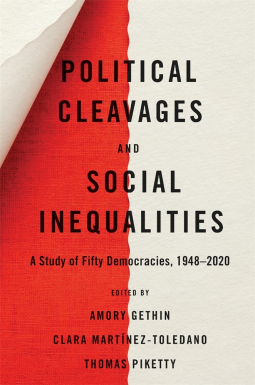
Political Cleavages and Social Inequalities
A Study of Fifty Democracies, 1948–2020
by Amory Gethin, Clara Martínez-Toledano, and Thomas Piketty
This title was previously available on NetGalley and is now archived.
Send NetGalley books directly to your Kindle or Kindle app
1
To read on a Kindle or Kindle app, please add kindle@netgalley.com as an approved email address to receive files in your Amazon account. Click here for step-by-step instructions.
2
Also find your Kindle email address within your Amazon account, and enter it here.
Pub Date Nov 16 2021 | Archive Date Nov 16 2021
Talking about this book? Use #PoliticalCleavagesandSocialInequalities #NetGalley. More hashtag tips!
Description
The empirical starting point for anyone who wants to understand political cleavages in the democratic world, based on a unique dataset covering fifty countries since World War II.
Who votes for whom and why? Why has growing inequality in many parts of the world not led to renewed class-based conflicts, seeming instead to have come with the emergence of new divides over identity and integration? News analysts, scholars, and citizens interested in exploring those questions inevitably lack relevant data, in particular the kinds of data that establish historical and international context. Political Cleavages and Social Inequalities provides the missing empirical background, collecting and examining a treasure trove of information on the dynamics of polarization in modern democracies.
The chapters draw on a unique set of surveys conducted between 1948 and 2020 in fifty countries on five continents, analyzing the links between voters’ political preferences and socioeconomic characteristics, such as income, education, wealth, occupation, religion, ethnicity, age, and gender. This analysis sheds new light on how political movements succeed in coalescing multiple interests and identities in contemporary democracies. It also helps us understand the conditions under which conflicts over inequality become politically salient, as well as the similarities and constraints of voters supporting ethnonationalist politicians like Narendra Modi, Jair Bolsonaro, Marine Le Pen, and Donald Trump.
Bringing together cutting-edge data and historical analysis, editors Amory Gethin, Clara Martínez-Toledano, and Thomas Piketty offer a vital resource for understanding the voting patterns of the present and the likely sources of future political conflict.
Amory Gethin is Research Fellow at the World Inequality Lab at the Paris School of Economics. Clara Martínez-Toledano is Assistant Professor at Imperial College London and Wealth Distribution Coordinator at the World Inequality Lab. Thomas Piketty is Professor at École des Hautes Études en Sciences Sociales (EHESS) and the Paris School of Economics and Co-Director of the World Inequality Lab.
Available Editions
| EDITION | Hardcover |
| ISBN | 9780674248427 |
| PRICE | $39.95 (USD) |



